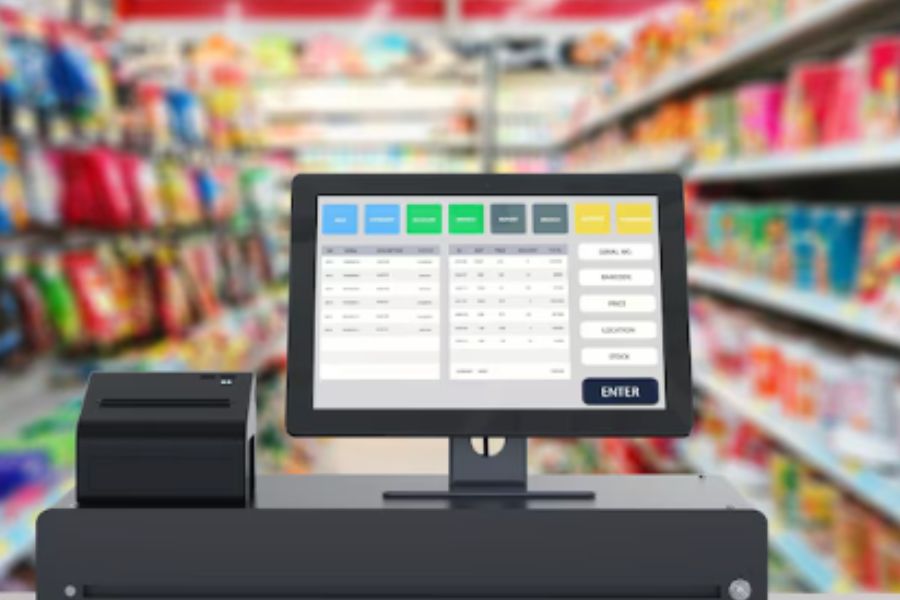Imagine businesses facing the challenge of seamlessly managing both online and in-store operations. Juggling inventory, customer data, and sales channels can quickly become overwhelming without the right tools. POS ecommerce software solves these issues by integrating sales channels, providing real-time inventory updates, and supporting multiple payment methods.
In this guide, we’ll dive into the top 5 POS ecommerce software redefining how businesses like yours handle sales.
Highlight:
- Unifying online and in-store operations eliminates stock discrepancies, ensures consistent pricing, and provides a seamless shopping experience for customers across all channels.
- Unifying online and in-store operations eliminates stock discrepancies, ensures consistent pricing, and provides a seamless shopping experience for customers across all channels.
The Issue of Selling Online and In-store Sales
The retail landscape has changed dramatically, requiring businesses to balance in-store and online operations efficiently. While both channels provide growth opportunities, they also introduce challenges that can impact sales and customer satisfaction.
One key issue is inventory management. Overstocking leads to wasted resources, while stockouts frustrate customers and result in lost sales. A POS ecommerce software with real-time inventory updates ensures stock consistency across channels.
Pricing and promotions also create friction. Customers often compare prices online and in-store, expecting uniformity. Discrepancies can erode trust, so retailers must adopt transparent pricing strategies or highlight exclusive offers for each channel.
Customer experience is another critical area. Shoppers value the convenience of ecommerce but also appreciate in-person interactions. Offering services like buy online, pick up in-store (BOPIS) and in-store returns for online purchases can improve customer satisfaction.
Online-only retailers often have lower operational costs, allowing them to offer competitive prices. Traditional retailers must use POS ecommerce software to integrate digital tools while leveraging in-store advantages such as personalized service and immediate product availability.
Adopting an omnichannel strategy allows businesses to overcome these challenges, creating a consistent shopping experience across all sales channels.
Why Your Business Needs POS Ecommerce Software
Retail businesses today must adapt to changing customer expectations and manage operations efficiently across multiple sales channels. A POS ecommerce software connects online and offline stores, reducing manual workload and improving overall business performance.
1. Centralized Sales and Inventory Management
Without proper synchronization, businesses risk overselling, stock discrepancies, and order fulfillment delays. A POS ecommerce software automatically updates inventory in real time, preventing stock-related issues and ensuring smooth operations.
2. Better Shopping Experience for Customers
Shoppers today expect flexibility in how they browse, purchase, and return products. A POS ecommerce software allows customers to:
- Buy online and pick up in-store (BOPIS).
- Return online purchases at physical stores.
- Access consistent pricing and promotions across all channels.
3. Smarter Decision-Making with Sales Insights
Understanding customer behavior, sales trends, and inventory turnover is key to business growth. A POS ecommerce software provides detailed reports and analytics, helping businesses adjust pricing, plan promotions, and restock efficiently.
4. Increased Productivity and Revenue
Businesses using integrated POS systems experience faster checkouts, fewer errors, and improved team productivity. Automating tasks like order processing, stock updates, and customer management allows staff to focus on sales and customer service, leading to higher revenue.
Investing in POS ecommerce software is the way to stay competitive, improve efficiency, and deliver a frictionless shopping experience.
Criteria for Selecting the Best POS Ecommerce Software
To ensure smooth business operations and deliver exceptional customer experiences, your business needs to consider:
Features
The features of POS ecommerce software are the foundation for its ability to streamline operations and enhance customer experiences. Here are some of the key features to look for:
- Inventory Management: Efficiently track and manage inventory across all sales channels in real time. This ensures stock accuracy, reduces overstocking or understocking, and simplifies reordering processes.
- Sales Reporting and Analytics: Access detailed sales data and insights to monitor performance, identify trends, and make informed decisions. Advanced reporting tools help improve forecasting and optimize operations.
- Omnichannel Integration: Connect your online store and physical outlets seamlessly. Features like buy-online-pickup-in-store (BOPIS) or return-in-store ensure a consistent customer experience across all channels.
- Multiple Payment Options: Support diverse payment methods, including cash, credit cards, mobile payments, and digital wallets, to provide flexibility and convenience for your customers.
- Customer Relationship Management (CRM): Store customer data, track purchase history, and personalize shopping experiences. Integrated loyalty programs and promotions can further boost customer engagement.
Integrability and Scalability
Ensure the POS ecommerce software integrates seamlessly with your existing systems, such as e-commerce platforms, accounting tools, and marketing solutions. ConnectPOS, for example, offers easy integration with platforms like Shopify, Magento, and WooCommerce, allowing you to synchronize all your sales channels effortlessly.
Scalability is equally important, the software should support your business growth by accommodating additional users, locations, and features as your needs evolve.
Pricing
Evaluate the software’s pricing structure to ensure it aligns with your budget. Consider upfront costs, subscription fees, transaction charges, and additional costs for upgrades or add-ons. A transparent pricing model will help you make a cost-effective decision without hidden expenses.
Customer Support
Reliable customer support is essential for resolving issues promptly and minimizing downtime. Look for providers that offer 24/7 support through multiple channels, such as chat, email, or phone, and prioritize those with a reputation for excellent service.
Top 5 POS Ecommerce Software to Streamline Online and In-store Sales
Now, let’s explore the top 5 POS ecommerce software solutions that help businesses streamline their operations across both online and offline sales channels.
ConnectPOS
ConnectPOS is a feature-rich POS ecommerce software designed for businesses that operate both online and in-store. Unlike many other solutions, ConnectPOS provides highly customizable features, real-time synchronization, and powerful integrations with leading ecommerce platforms like Shopify, Magento, and WooCommerce.
This means businesses can manage their online and offline sales from a single, unified platform, ensuring consistent stock levels, streamlined transactions, and accurate reporting.
Key Features:
- Real-Time Synchronization – Inventory updates instantly across all sales channels.
- Multi-Device Compatibility – Works on desktops, tablets, and mobile devices.
- Customizable Checkout Process – Supports split payments, partial payments, and multiple tax settings.
- Advanced Promotions & Discounts – Enables businesses to create bundle deals, custom pricing rules, and loyalty rewards.
- Offline Mode – Processes transactions even when the internet is down, automatically syncing data once connectivity is restored.
- Multi-Store & Multi-Warehouse Management – Tracks inventory across multiple locations.
- Omnichannel Customer Experience – Supports BOPIS, in-store returns for online purchases, and personalized recommendations based on purchase history.
- Flexible Payment Integrations – Works with various payment gateways, including Stripe, PayPal, and regional payment providers.
- Comprehensive Reporting & Analytics – Provides sales forecasts, customer insights, and inventory movement reports for smarter decision-making.
E-commerce businesses looking for a comprehensive POS solution that can handle both online and physical store transactions, offering advanced features and integrations for a seamless experience.
Shopify POS
Shopify POS is an intuitive and widely used point-of-sale solution built specifically for Shopify store owners. It is ideal for businesses that already use Shopify for their online store, as it offers seamless integration between online and offline sales.
Shopify POS allows retailers to manage inventory, process payments, and track customer data all from a single dashboard, making it easy to run both e-commerce and brick-and-mortar stores.
Key Features:
- Simple setup and integration with Shopify online stores.
- Comprehensive reporting tools for tracking sales and performance.
- Ability to accept multiple payment methods, including mobile payments.
- Inventory management with real-time updates across both online and physical locations.
Shopify-based businesses seeking an easy-to-use, all-in-one POS solution that integrates well with their existing e-commerce platform for streamlined management of both in-store and online sales.
Square POS
Square POS is a versatile and affordable point-of-sale system designed for small and medium-sized businesses. Known for its ease of use, Square offers an integrated solution for businesses that operate both online and offline. It allows retailers to manage everything from payment processing and inventory tracking to customer data and reporting. Square also offers a wide variety of hardware options, from registers to card readers, making it ideal for businesses looking for flexibility.
Key Features:
- Easy-to-use interface with minimal setup required.
- Integration with Square’s online store and third-party e-commerce platforms.
- Real-time inventory management and automatic stock updates.
- Advanced customer management tools, including CRM capabilities and loyalty programs.
Small to mid-sized businesses looking for an affordable, easy-to-use POS system with powerful features and flexibility for both in-person and online sales.
Lightspeed
Lightspeed is a robust and feature-rich POS system that caters to retailers with both physical and online stores. It provides deep insights into sales data, inventory, and customer trends, making it a great choice for businesses looking to scale.
Lightspeed is known for its strong integration with e-commerce platforms like Shopify and BigCommerce, allowing for smooth synchronization of online and in-store sales.
Key Features:
- Detailed analytics and reports for in-depth business insights.
- Advanced inventory management with real-time updates.
- Multi-location support for businesses with multiple physical stores.
- Seamless integration with various e-commerce platforms.
Medium to large-sized businesses that require a POS solution with advanced features and analytics to manage both online and physical retail operations effectively.
Clover POS
Clover POS is a flexible and customizable point-of-sale solution that offers both hardware and software for managing sales and inventory. It is particularly suited for businesses with diverse needs, as it allows for high customization. Clover integrates with several popular e-commerce platforms, allowing businesses to manage both their online and in-store sales from one central system. It also features a range of customer engagement tools to help build loyalty.
Key Features:
- Wide range of hardware options, from registers to handheld devices.
- Real-time synchronization of online and offline inventory.
- Customizable reports and insights to track business performance.
- Loyalty programs and promotional tools for customer engagement.
Businesses looking for a highly customizable POS solution with strong integration options and flexibility for managing both in-person and online transactions.
FAQs: POS Ecommerce Software
- What is the difference between POS and POS ecommerce software?
POS software handles in-store transactions, while POS e-commerce software integrates both online and offline sales management.
- How do I integrate POS software with my existing ecommerce platform?
Integrate POS software with your e-commerce platform via APIs or native integrations offered by your POS provider.
- What are the hardware requirements for POS ecommerce systems?
POS e-commerce systems require compatible devices like tablets, card readers, barcode scanners, and receipt printers for seamless operations.
Conclusion
By adopting a unified POS ecommerce software, retailers can efficiently manage inventory, optimize sales, and enhance the customer experience across multiple channels. Solutions like ConnectPOS, Shopify POS, Square POS, Lightspeed, and Clover POS provide businesses with the tools they need to stay competitive and meet modern consumer expectations.
For businesses seeking seamless integration between online and offline sales, ConnectPOS offers a comprehensive, customizable solution. Contact us to advise and book a demo if you need to!



